It was cold in the old
house on the Plains Road in Montville,
Maine. Martin couldn’t get out of bed
anymore. There was no heat in the old
house, as he couldn’t get up to wood the
fire in the kitchen stove. Dell was
working at a neighboring farm, or so
Martin thought. Robbie was in school. The
boys tended out on him as best they knew
how. Neighbor Maria Griffin checked in now
and then, bringing him hot soup.
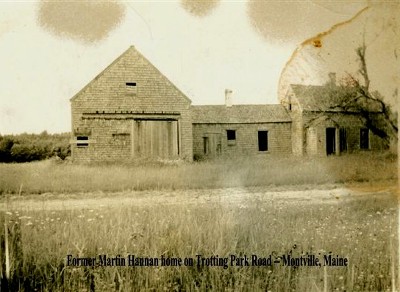 Martin missed
Melinda, the wife of his youth. She had
been gone nearly eighteen years now.
Memories flooded, as he bore the pain of
the old War wounds. Seemed like things had
gotten much worse lately. Perhaps it was
the chill of winter coming on. He dreaded
the cold and loneliness of the coming
winter.
Martin missed
Melinda, the wife of his youth. She had
been gone nearly eighteen years now.
Memories flooded, as he bore the pain of
the old War wounds. Seemed like things had
gotten much worse lately. Perhaps it was
the chill of winter coming on. He dreaded
the cold and loneliness of the coming
winter.
Mart, as Melinda and his
family fondly called him, recalled that
hot July day in 1862, actually the last
day of the month, that he had arrived at
the farm of Levi Bartlett on the other end
of Montville, near the Freedom town line,
and next-door to old Mr. Whitten. Mart and
his brother, Horace Hannan, had walked,
catching a ride part way on the back of a
wagon, from South Liberty to the farm to
help with the haying. They would be
staying with the Bartlett family 'til the
loose hay was all in the barn.
That morning they started
mowing the field on the lower side of the
road. Swish, swish, swish, was the sound
of the hand-scythes as Levi stepped into
the field, cutting a swath, followed by
Mart, who in turn was followed by Horace,
then by three farm hands. Swish, swish,
swish, as the men kept in rhythm across
the hay field. It was hot, as Mart
recalled, but he would soon experience
heat much hotter than any heat he’d felt
on a hot Maine summer day.
As they mowed back across
the field after several swaths, a man rode
up on a sleek black horse. Levi yelled,
asking the man what his business was.
After asking the sweaty workmen if they
were aware of the bloody battle of the
previous year at Bull Run, in which nearly
three thousand of the Northern soldiers
had been killed, wounded, or just plain
missing, he identified himself as a
Recruiter for President Abraham Lincoln,
who was asking for volunteers to sign on
to fight the menacing Southern Army of
General and President of the Confederacy,
Robert E. Lee.
Mart recalled that after
the Recruiter left, Levi and the farm help
went back to their task of mowing the
field, swish, swish, swish. Mart was a
strong young man of twenty-two years, able
to keep up the hardiest of his friends and
neighbors, and able to do a long, hard
day’s work. The words brought by the
passing messenger echoed in his ears. It
shouldn’t take long to whip the Rebels,
and keep the country strong and secure.
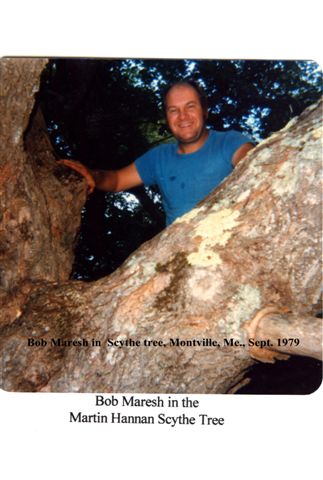 Levi’s daughter
yelled across the field that it was time
for dinner as they arrived back by the
roadside. Mart hung his scythe in a young
sapling maple tree, as the men went back
to the farmhouse to eat dinner. He didn’t
have much to say that day. He pushed back
his plate and chair after eating the
hearty dinner prepared by Ann Bartlett and
her daughter, Ann, and reached for his
straw hat. “I’ll finish the field when I
get back,” he told them. “I’m going after
that Recruiter!” As he started down the
road, he heard Horace yell, “Wait up. I’m
going with you!”
Levi’s daughter
yelled across the field that it was time
for dinner as they arrived back by the
roadside. Mart hung his scythe in a young
sapling maple tree, as the men went back
to the farmhouse to eat dinner. He didn’t
have much to say that day. He pushed back
his plate and chair after eating the
hearty dinner prepared by Ann Bartlett and
her daughter, Ann, and reached for his
straw hat. “I’ll finish the field when I
get back,” he told them. “I’m going after
that Recruiter!” As he started down the
road, he heard Horace yell, “Wait up. I’m
going with you!”
Mart and Horace returned
home to South Liberty to tell their family
of their decision. They had a month to get
their affairs in order. There was a
beautiful young seventeen-year-old girl
over on the New England Road in Searsmont
that Mart wanted to speak to before
he left.
Mart winced at his pain
and the cold, as memories of what that
decision had had on his life. He and
Horace went to Bath, Maine, along with
some of the other men and boys of the
community, many of them he knew from
Montville, Liberty, Palermo, Searsmont,
and other local towns, to be mustered into
the service for three years. There they
received a royal-blue uniform and cap, a
brown woolen Army blanket, and a pair of
ill-fitting shoes. They left Bath by
train, into an unknown land, with unknown
battles to be fought. At Bath they were
paid a $25 bounty, after they were sworn
into Company B of the Nineteenth
Regiment of the Maine Volunteers. “What
were we thinking?”, Mart mused. From that
day in August, 1862 in Bath, when they
were mustered into the Union Army, life as
they knew it changed forever.
They first arrived by
train in Washington, D. C. From then on,
they marched. It seemed that it was always
hot. It rained a lot also, as they trudged
through mud, sometimes nearly up to their
knees. Their meals were mostly hard bread
and beef, with strong hot tea. Drills were
held, again and again. The enemy was
everywhere. It was hard to tell who was
friend and who was foe. The only
difference was the color of their uniform,
and once they were all dirty and dusty, it
was even harder to see a difference.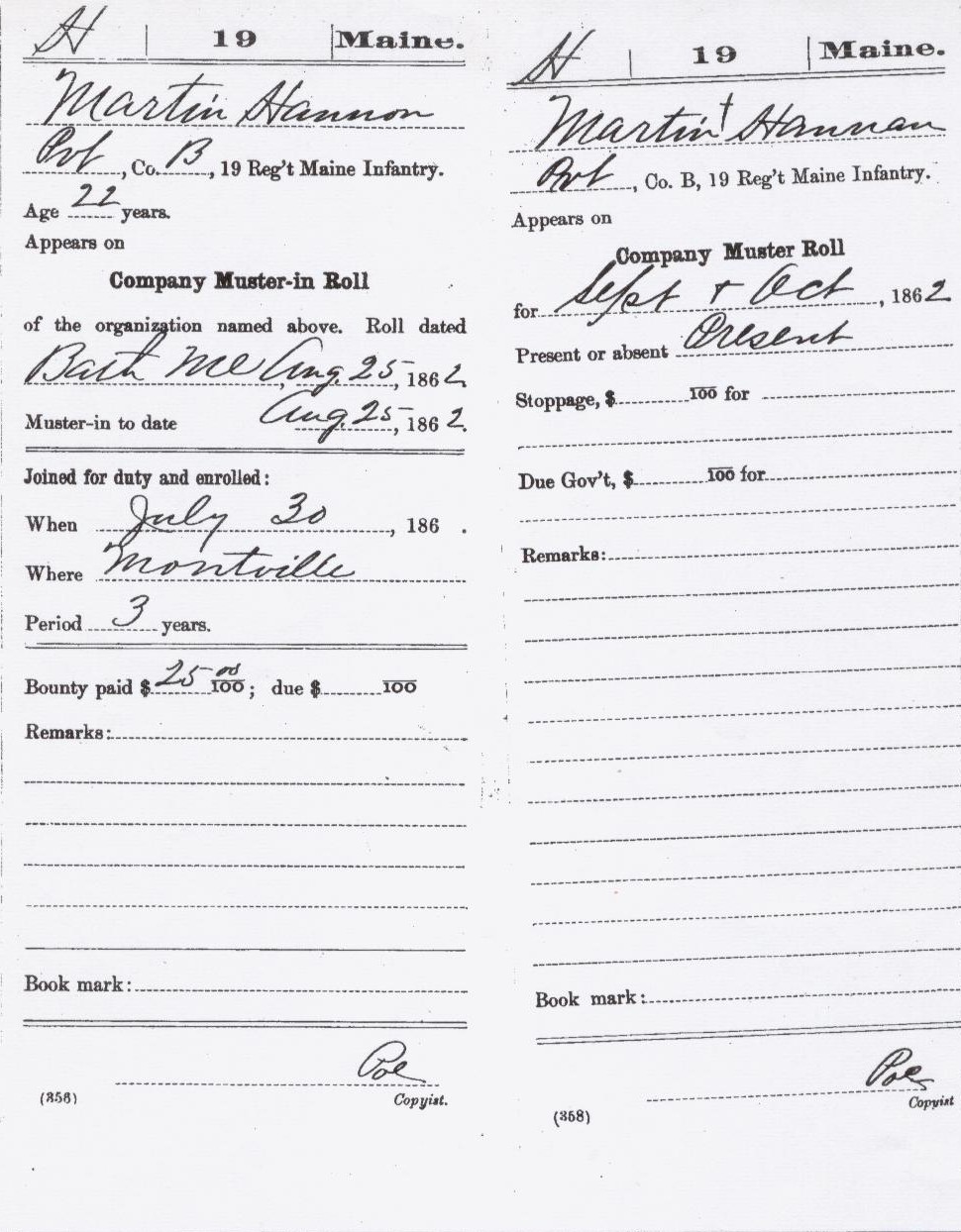
Mart’s memories were
vividly real to him, as he tried to get
comfortable in the cold old house. As
vividly as when he swore out an affidavit,
while applying for a pension, about the
injuries that he’d received in Dec., 1862.
He had been detailed to Hazard’s Battery.
At Bell Plains, Virginia, they were
building a ‘corduroy’ road just before the
Battle of Fredericksburg, Virginia. He and
three comrades were carrying a large log
to put into the road. The ground was very
rough. Mart winced as he remembered
stepping into a hole, and felt the severe
pain through his lower stomach and groin
area. Doctor Billings told him that he had
ruptured his groin area and his testicles.
The War ground on. Some
of the men had come down with measles. No
one would have thought that a childhood
disease like measles, would kill grown
men, but several men had perished as the
result of contracting the measles. Mart
had heard of another Company having the
threat of a smallpox outbreak.
In March of 1863, some of
the officers felt that Mart had leadership
qualities and promoted him to Captain.
He’d made some good friends, a few who had
left home with him, among whom were John
M. Wellington, Orrin Overlock, Edward
Mitchell, Stephen Daggett, Benjamin
Crooker, and Israel H. Cross, and oh, so
many other comrades. There were some good
times with the comrades, but it was hard
to recall them now. They’d play cards at
night, if they were not too tired, and it
was a time to write home, if one had
paper, a pen, and a stamp. Ink was hard to
come by, and a letter written in ink could
easily be smudged if the rain got on it.
If someone had a musical instrument, the
mournful sound carried throughout the
camp.
In the middle of June,
1863, while they were marching from
Falmouth and Fredericksburg, Virginia, at
a place called Dumfree, Virginia, it had
been a very hot day, so hot that Mart felt
that he couldn’t go on. The next thing he
remembered, he woke up, looking up at the
hot sun, now knowing how long he’d been
unconscious. He crawled under some bushes
by the side of the road. That day about a
dozen of his comrades had been stricken by
the heat. Brother Horace and Bill
Churchill were also on the march that day.
Israel Cross, the comrade from
Lincolnville, stayed with Mart til
nightfall, which brought a little relief.
The soldiers brought the stricken men into
camp late at night in an Army hospital
wagon. Dr. Billings tended to him, and
other fallen soldiers. The next night Mart
and Israel caught up with the Regiment.
Some men were not so lucky, and completely
heat-struck.
On and on throughout the
country they marched. It was always hot.
In July, 1863, they’d marched to
Gettysburg, Pennsylvania. Mart had never
seen so many men in one place, lined up on
opposite knolls. Then all hell broke
loose. Men fell on the left, on the right,
in front and behind him. He could hear
screams, yelling and moans of the wounded
and dying. There was no time to even think
of his younger brother, Horace. Then he
felt the hit. He’d been struck by a shell
fragment in his left hip. It broke the
skin, but he was so much better off than
many around him. He did not complain. That
night his comrades convinced him to tell
the Regiment surgeon, Doctor Billings, who
dressed the wound and applied a plaster.
But the darn thing wouldn’t stay on, and
chaffed it even more. He threw the plaster
by the roadside. But, yes sir, he was back
in action the very next day. In September,
1863, he was once again promoted, this
time to Sergeant.
In January, 1864, Major
Rollins and Captain McDonald, the
commanders of the Invalid Corps ordered
Mart to Camp Berry in Portland, Maine as a
Recruiter. He wondered if he should have
tried to convince others to go through
what he had been through. But that old War
couldn’t last forever. He was allowed a
furlough to go home. The cold Maine winter
seemed pretty darn good to him, after the
extreme heat of the South.
While home on a furlough,
Mart went to Searsmont to see pretty
Melinda Herrick, who lived with her
parents, Andrew and Betsey Herrick on the
New England Road. Mart and Melinda were
married in Montville on
February twenty-first, 1864, by Rev.
Moses McFarland. They intended
to spend the rest of their lives
together. Mart returned to Portland, where
he was Recruiting officer til January,
1864, when he returned to his Regiment. He
received an honorable discharge from the
Army at Bailey’s Crossing, Virginia on
the thirty-first of May, 1865. Nearly
three years in the service of the Union,
and he had the scars and pain to show for
his service time. Mart recalled that he
felt as though he’d been through the fires
and trials that the ministers preached
about in the Sunday services that the
servicemen had attended.
Mart returned to South
Liberty, where he purchased the
seventy-acre farm that had belonged to old
Robert Lermond, who had died in 1860,
bordering on the farm of his parents, John
C. and Julia Hannan. The farmhouse had
been vacant for some time. Robert
Lermond’s son, John, who lived over in the
Fishtown section of Appleton, had
purchased the farm from the heirs. Mart
and Melinda had moved onto the farm
shortly after their marriage. He’d gotten
the farm paid off in 1870, receiving the
deed at that time from Lermond.
Mart and Melinda settled
down to raise a family on the farm. Their
firstborn, Charley was born in 1866,
followed by Annie, Addie, Herbert, Rose,
as pretty as her name, Odell, named for
Mart’s grandfather, John Odell Hannan,
Carrie, who he fondly called ‘Cad’, Ella,
and the baby, Robbie, born after moving up
to the Plains, in 1885.
Mart did some farming,
and coopering in his shop, where he made
barrels, called casks, for the lime
industry in Rockland. He’d harness up the
horse, load the hay wagon with casks,
drive through Fishtown and Burkettville,
to Union, down through Rockport, on to
Rockland. The casks did not bring in much
money, but the work was light, and could
be done on rainy days and early evenings
in the summer, as well as the cold snowy
days in the winter in his cooper shop
where he kept a wood fire to take off the
chill. On the way home from Rockland,
after delivering the barrels to the lime
industry, he would pick up staples by the
barrel, gallon or sack, such as flour,
crackers, molasses, etc., and a little
treat for the young ones, if the load had
been profitable at all.
Since his discharge from
the Army, Mart had suffered from heart
palpations, dizziness and even fainting
spells. One day he passed out while
working on the farm. His brother Bill
happened along, thinking that Mart was
dead, quickly went for their parents, John
C. and Julia Hannan. Dr. Young was called,
and admonished Mart to keep out of the
sun. The doctor had considered that it was
probably from the heatstroke suffered in
the South. Any exertion brought on
dizzy spells. The War wound and rupture
were a constant source of pain. He
sometimes told of troubles in his head.
Mart applied for a
Government Pension. James Fish who had
known Mart since he was a young child,
testified by affidavit as to how rugged a
man Mart had been before he went to War.
His War comrades, Edwin S. Mitchell, who
had once been a tent mate, testified that
he saw Mart fall under the weight of the
log in the Army at Bell Plains. Another
old tent mate, Israel H. Cross of
Lincolnville, testified by affidavit of
watching over Mart when he was unconscious
over half a day with sun stroke. After
returning home, Mart had been treated by
Dr. Young, who had died in 1875, then
by Dr. B. H. Bacheldor of Montville,
until his death in 1889, and
later treated by Dr. E. L. Porter of
Liberty.
As Mart signed his name,
Martin Hannan, on affidavit after
affidavit, he recalled that he had been
named for his grandfather, Martin
Overlock, a descendant of the hardy German
immigrants who had come to Old Broad Bay,
later called Waldoboro, from Germany, many
years before settling in South Liberty.
The elder Martin lived to a ripe old age.
Mart’s neighbor, Hathorne
Brawn, who later married his daughter,
Annie, testified by affidavit that Mart
was often struck by nervousness and
prostration, and would suffer from
coldness even on a hot day. George Smith,
a near neighbor for about ten years,
testified by affidavit in 1893 that Mart
suffered from shortness of breath, and
could not do hard labor. Mart received a
Pension of $4 a month, eventually
increased to $8 a month for the rest of
his life.
Mart and Melinda were
doing fairly well on the farm in South
Liberty. In Mart’s eyes, she was a
beautiful girl. She kept the children fed
and clean, scrubbing their clothes on a
washboard, carrying water from the well
for the household, as well as helping him
with the little garden that they grew. She
canned and salted down the vegetables for
their winter larder. He had a cow, a
horse, and annually raised a pig for their
table use. He and Melinda salted down the
pork for use in baking Saturday night
baked beans, and for ‘trying’ out each day
to eat on the potatoes and vegetables that
they raised in the garden. It seemed to
him that Melinda worked a little harder
than a lot of the neighbor women, because
of the fact that he was just not able to
do what he’d liked to have done. Some days
it was just hard breathing. Melinda and
young Herbert would do the farm work, as
well as keeping the family together. Mart
had taught Herbert to shoot. They both
were quite lucky hunters, bringing in
venison and rabbits to supplement the
family larder.
Melinda’s sister, Olive
Robinson, lived way Down East. She and
Melinda kept in touch by letters. Shortly
before Robbie birth, Melinda wrote to
Olive, telling her that Mart had finally
gotten his Pension, and that Charley would
be bringing her down to visit one of these
days.
Mart and Melinda, with
their growing family, had moved from his
father’s neighborhood in South Liberty in
the fall of 1884, to a farmhouse with
twenty acres, more or less, on the Plains
Road in Montville. He had purchased the
farm from his Aunt Sarah Hannan for $125.
They had moved into the farmhouse, giving
Aunt Sarah payments, such as he could,
with the boys’ help, until the place was
paid off.
It was five and half
weeks after baby Robbie was born, and
Melinda still had not rallied. It was her
eighth child, a difficult birth, and she
was sinking fast. Melinda’s mother had
died a year after their marriage. Her
father, Andrew, had hung himself during a
time of depression in April of the
previous year. Martin’s mother, Julie,
passed away on the nineteenth of
February, 1885, so there was no one in the
family to come to their assistance. Their
girls did what they could, and tended out
on the younger children, getting meals,
and generally keeping house. Melinda died
on Wednesday, the twenty-second of
April 1885. She was only forty years old.
He laid her to rest beside her parents in
the Village Cemetery in Searsmont. There
was a small wooden marker to mark her
gravesite, with no stone to mark his
in-laws’ graves. He planned to buy Melinda
a fancy headstone, but the little wooden
marker would have to do for the time
being.
On the very day that
Melinda died, Aunt Sarah had signed the
papers deeding the property to Mart. It
was to be the home that Mart and Melinda
would farm and live to old age together.
After Melinda’s death,
with an infant to take care of, living on
the Plains Road, Mart struggled to keep
his family together. The girls helped care
for little Robbie. Annie had married a
month before Melinda’s death, at age
seventeen, to Hawthorn Brawn, and lived
nearby. Addie, who a lot of people called
Jennie, was age fifteen, when she married
Daniel Linscott six months after Melinda’s
death. Daniel was nine years older than
Addie. In spite of rumors, Mart
hoped that Daniel would be good to his
daughter.
Herbert was but twelve
years old when his mother died. He’d
always been a help to Mart, even when he
was a small child. He seemed to sense that
his father was not well. Because Mart was
not well enough to do hard labor, he had a
lot of time to watch over little Robbie.
When Melinda died, Charley was nineteen, a
year older than Horace had been when they
joined the Army. Charles was out on his
own, working at local farms. Rose was
eleven years old, Odell was nine, Cad,
nearly six, Ella was four years old, and
baby Robert was just a tiny infant of a
little over a month old. Mart had always
been so good at remembering his children’s
birth dates, but he was getting a little
forgetful. Who could blame him?
Mart remember the fateful
day in 1891, when ten-year old Ella, a
beautiful fair-skinned child, who looked
so much like her mother, fell out of the
old apple tree while playing with Cad. She
struck on her head and neck, and almost
immediately perished. There was no room to
bury Ella with her mother, so Mart had
purchased a cemetery plot in Searsmont, in
the Pine Grove Cemetery, near the South
Montville Town line. Two lives cut short
in a brief span of time, in the prime of
their lives, taking a piece of Mart’s
heart with them. How he missed them both.
Someday he’d move Melinda’s remains there
to be interred next to Ella, and he when
his time came..
Mart’s father, John Colby
Hannan, who had also served in the Civil
War, died on the fifteenth of August
1901. He was 82 years old. John had not
served in the same Regiment as Mart,
Horace, and later William. When talking
about their War experiences, John had told
Mart on more than one occasion, how hard
it had been for an older man to keep up
with the younger soldiers.
So many of those closest
to Mart had gone on before him. Mart
attempted to shift over in his bed, though
he could not move much because of the
pain. He was trying to keep warm. It was
now November, 1903. Winter seemed to
coming in early, or perhaps it was just
his old bones that thought that it was
colder than usual. Perhaps Maria would
bring in some hot soup or oatmeal this
morning. Hark! Did his ears deceive him,
or did he hear sleigh bells? Someone was
at the door. “Maria?”, he called. It was
not Maria, but Herbert coming to check on
him. Behind him followed Cad, and Dell.
Dell had not gone to work, but had gone
for Herbert and Cad instead.
Cad had her own problems.
She had married the mail carrier, Charles
Marden, when she was eighteen. Little
Delbert, her first-born son had drowned in
the mill pond two months ago. He was a
month shy of being 5 years old.
“What’s that you say,
Cad? It’s colder in here than outside. I
just can’t get out of bed to wood the
fires.” “What’s that, you say, Herbert?
You’re taking me home with you.”
Cad put Mart’s old
royal-blue Army coat with the brass
military buttons onto him. Today it would
nearly go around him twice. “My, Papa,
you’ve lost weight”, Cad said. He supposed
that he had. When he entered the Army,
they weighed and measured him at Bath. He
was five feet, nine and a half inches
tall, and weighed a good sum. They
recorded that he had a light complexion,
dark eyes and brown hair. What hair he had
left was totally white. Melinda always
said that he had “pretty blue eyes”. Yes,
he was sure that he probably had lost some
weight, and was but a shadow of the man
that he had been, when he left the
hayfield in the prime of his life, to go
to War. He recalled that day, when he had
hung the scythe in the crotch of the
sapling maple. He had fully intended to
come back and finish up the haying, but it
wasn’t meant to be. He’d met Levi Bartlett
a few years back. Levi told him that the
tree had grown around the scythe, and he
had left it as a testimony to the young
man who’d gone off the fight the Rebels.
His mind snapped back to
the present. Herbert and Dell got Martin
onto a home-made stretcher. Cad and Dell
were wrapping his old brown woolen Army
blanket around him. He recalled the many
nights in the South, when he slept with
the old blanket on the cold ground. But,
that was in the past.
Mart’s two sons gently
carried their father out to the waiting
horse and loaded him onto the pung, with
Cad riding on the back with him. They then
drove the horse across the Plains Road to
Ben Boynton’s farm in the Kingdom, where
Herbert’s wife [and Ben’s daughter]
Millie, and children were waiting in the
warm old farmhouse kitchen. A bed had been
prepared for Mart in the front parlor
where a fire was burning brightly in the
parlor stove. Mart was warmly and lovingly
tucked into bed. As they took off the blue
Army coat, four-year old Mildred, and
Gladys, not quite two years old, rubbed
the soft wool of the coat, while Herbert,
Jr., aged a year and a half, was
fascinated by the shiny brass buttons.
Mart told Cad to give the coat to Mille to
make warm outerwear for the little ones.
He said, “I probably will have no more use
of it now!”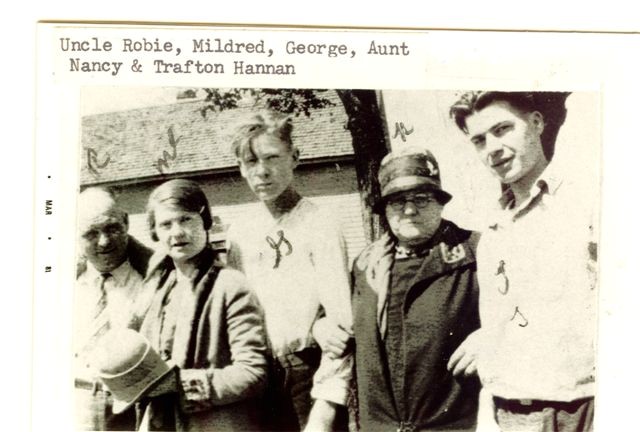
Millie brought Mart some
venison stew and hot “slut” biscuits with
home-made butter. Herbert brought him a
glass of cold raw milk, which tasted so
good. Old Ben Boynton welcomed Mart to
their home. The young ones roamed in and
out of the room, chatting to him and each
other, seemingly happy to have him there.
Mart enjoyed telling them stories of his
War years, reminding them that their
great-grandfather, John Colby Hannan, had
also served in the War, along with
great-uncles, Horace and William. Mart
knew that the children were too young to
understand all that he told them, but he
enjoyed their company.
Mart spent a pleasant
winter, though his body was wasting away
and racked with pain. Spring would soon
come, and perhaps some time outside would
be pleasant. He could dream of the warm
days. Dr. Albert D. Ramsay of Brooks came
to treat and medicate him, to try to make
him more comfortable from the chronic
inflammation of the old War wounds.
Martin Van Buren Hannan
died in the loving home of Herbert, Millie
and their young children on a warm Spring
day, on Sunday, April tenth, 1904. He
was but sixty-four years of age, but
had suffered much more than a man of his
years should have. He was laid to rest in
the Pine Grove Cemetery in Searsmont, with
little Ella. He’d never gotten around to
bringing Melinda’s remains to join him and
Ella. There was no gravestone to mark his
burial site, until many years later, when
his descendants, Mildred, Gladys, Herbert
and David obtained a Government grave
marker and a simple gray granite monument
with “HANNAN” etched on it, as well as
grave markers for Herbert and
Millie.
[In 2006, great-granson,
Fred Bragdon, of Vassalboro, Maine, had
the Government gravestone for Martin
Hannan, in Pine Grove Cemetery, turned
over and engraved with the correct
data. The former gravestone had
'MARINE' engraved on it in error.
Fred had the etching changed to 'MAINE'.]
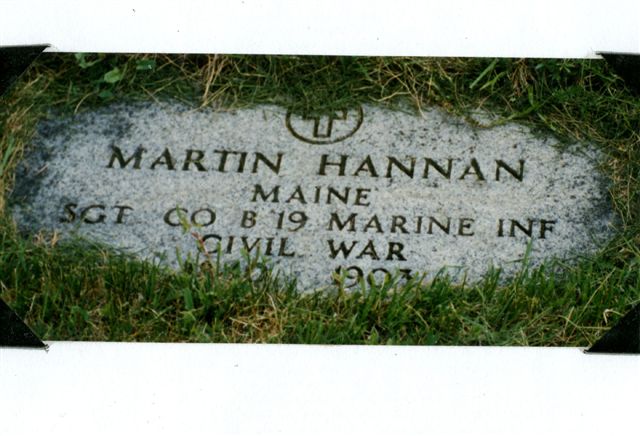
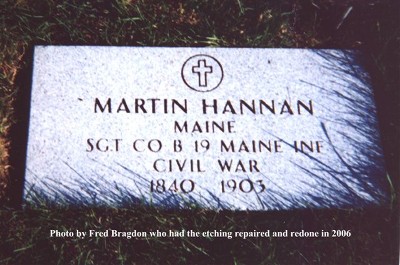
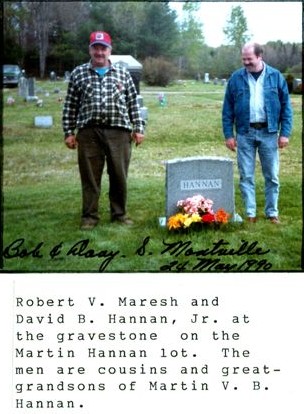
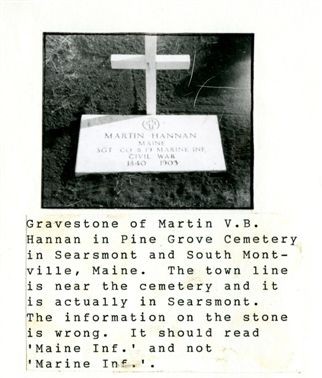
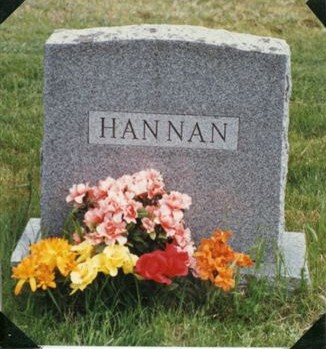


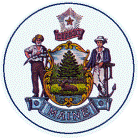
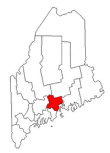
 Martin missed
Melinda, the wife of his youth. She had
been gone nearly eighteen years now.
Memories flooded, as he bore the pain of
the old War wounds. Seemed like things had
gotten much worse lately. Perhaps it was
the chill of winter coming on. He dreaded
the cold and loneliness of the coming
winter.
Martin missed
Melinda, the wife of his youth. She had
been gone nearly eighteen years now.
Memories flooded, as he bore the pain of
the old War wounds. Seemed like things had
gotten much worse lately. Perhaps it was
the chill of winter coming on. He dreaded
the cold and loneliness of the coming
winter. Levi’s daughter
yelled across the field that it was time
for dinner as they arrived back by the
roadside. Mart hung his scythe in a young
sapling maple tree, as the men went back
to the farmhouse to eat dinner. He didn’t
have much to say that day. He pushed back
his plate and chair after eating the
hearty dinner prepared by Ann Bartlett and
her daughter, Ann, and reached for his
straw hat. “I’ll finish the field when I
get back,” he told them. “I’m going after
that Recruiter!” As he started down the
road, he heard Horace yell, “Wait up. I’m
going with you!”
Levi’s daughter
yelled across the field that it was time
for dinner as they arrived back by the
roadside. Mart hung his scythe in a young
sapling maple tree, as the men went back
to the farmhouse to eat dinner. He didn’t
have much to say that day. He pushed back
his plate and chair after eating the
hearty dinner prepared by Ann Bartlett and
her daughter, Ann, and reached for his
straw hat. “I’ll finish the field when I
get back,” he told them. “I’m going after
that Recruiter!” As he started down the
road, he heard Horace yell, “Wait up. I’m
going with you!”






